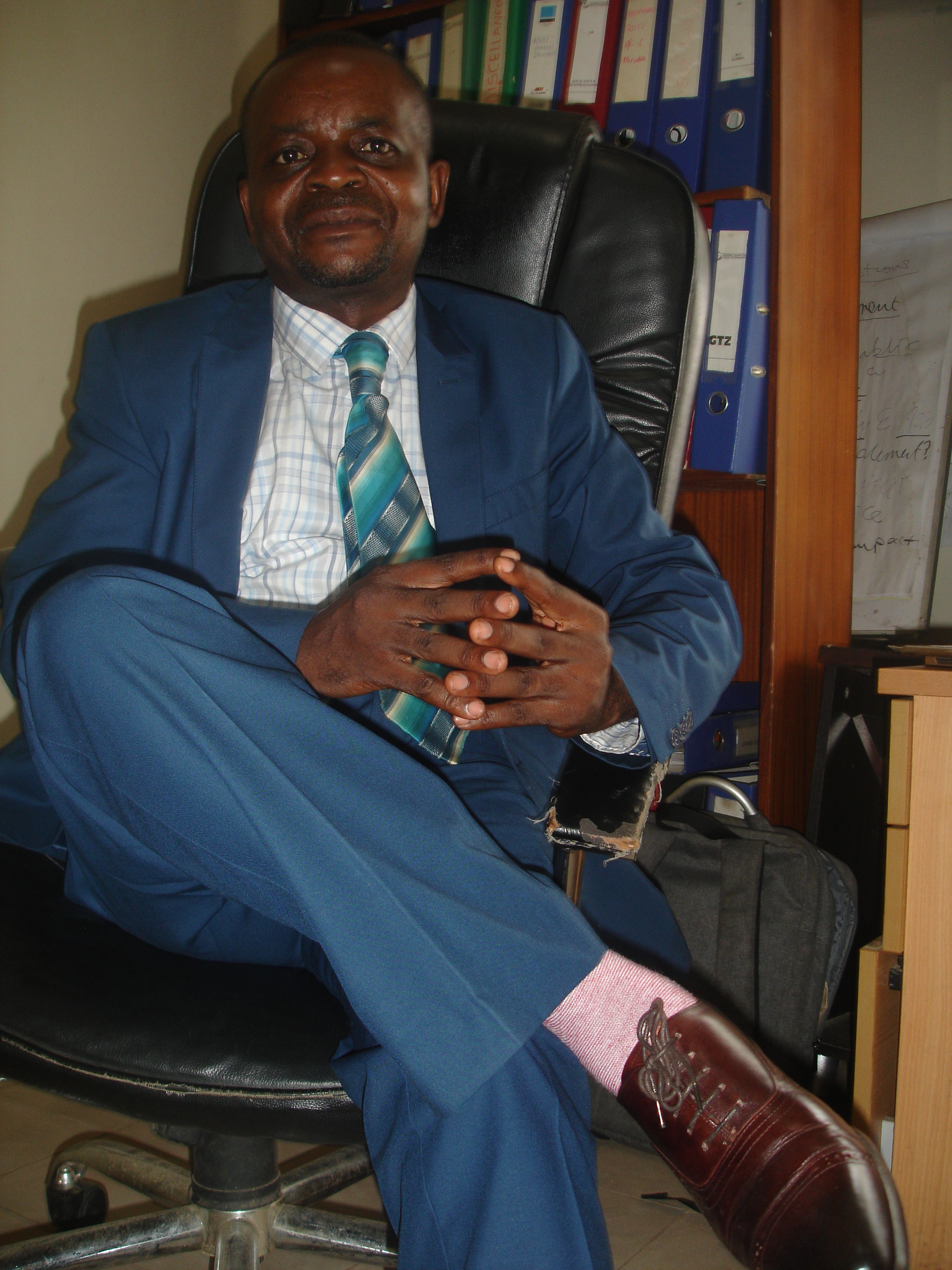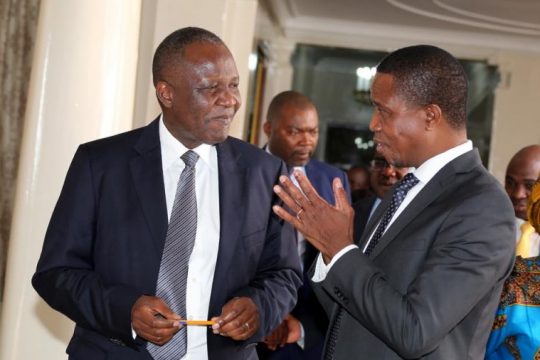Taxes in Zambia are burdensome on the poor-cries Lewis Mwape
Notice: Undefined index: catFilterList in /home/zambi/public_html/wp-content/plugins/wp-likes/api.php on line 243

Zambia Council for Social Development Executive Director Lewis Mwape in Thornpark Lusaka Monday 29th January 2018 pix by Derrick Sinjela
By Derrick Sinjela and Japhet Sinyinza

Zambia’s Works and Supply Minister Felix Chipota Mutati with Finance Minister Margaret Mh’ango Mwanakatwe
The Zambia Tax Platform (ZTP), a consortium of organizations working to promote tax justice, is concerned about the high taxes citizens are paying in Zambia, laments Chairperson, Lewis Mwape.
While welcoming Government plans on expanding the tax base domestically, Mr. Mwape advised the Patriotic Front (PF) leadership on a need to ensure that local revenues are raised in a progressive manner.
Mwape, serving as Zambia Council for Social Development (ZCSD) Executive Director observed that currently, personal incomes are highly eroded due to the many taxes, levies and fees that the Zambian Government is collecting.
“Currently income earners getting above K5, 900.00 are subjected to Pay As You Earn (P.A.Y.E) as high as 37.5%. Withholding taxes, road taxes, social security taxes and other different levies and fees are leaving citizens with very little disposable income, which is negatively impacting savings and investments in the Zambia. Excise taxes on electricity, fuel and talk time commodities are burdening our people, already failing to cope with high poverty, high income inequality and high unemployment,” regretted Mwape on behalf of the 15-Member Zambia Tax Platform , who alphabetically are: Action Aid Zambia, Centre For Trade Policy and Development (CTPD), Consumer Unit and Trust Society (CUTS), Caritas Zambia, CSO SUN (Civil Society for Scaling Up Nutrition), Green Life Conservation of Zambia (GLCZ), Jesuit Centre for Theological Reflection (JCTR), Civil Society for Poverty Reduction (CSPR), Young Volunteers for the Environment, The Non-Governmental Organisations’ Coordinating Council (NGOCC), Diakonia, Zambia Council for Social Development (ZCSD), of Zambia (EAZ).
Mwape insisted on a need to balance the need to protect the most vulnerable in Zambian society with the need to increase revenue collections locally.
“There is a lot of potential in the Zambia to reap more benefit from natural resources and it is in this area that we urge the government to focus its energy. The current policy direction is that resources need to be mobilized locally, thus government must focus on collecting the right amount of taxes from those more capable of paying, such as multinational companies,” admonished Mwape.
Mwape observed that Zambia had since signed 23 double taxation agreements with different countries thus creating opportunities for tax avoidance.
“The Government must revise all the 23 tax treaties to collect more from investments in Zambia. Action Aid reports show how through one treaty alone, US$7.4 million was not collected by Government through tax avoidance mechanisms of one firm. This simply shows the potential the government can collect if these treaties are revised,” said Mwape.
The Zambia Tax Platform called for review of numerous tax incentives offered to investors capable of unnecessarily eroding the tax base as investors are still willing to invest in the country regardless of these incentives.
“Multinational companies attain incredible benefits from investing in Zambia. A number of investment perception surveys have revealed that factors such as infrastructure and access to markets are more important to attracting foreign direct investments than tax incentives,” said Mwape.
Mwape recollected that Glencore alone, which owns Mopani Mine on the Copperbelt in Kitwe, made revenues of US$152.948 billion in 2016, almost seven times the Zambian Gloss Domestic {Product (GDP), while .
A 2015 Extractive Industry Initiative (EITI) report indicated that Glencore’s subsidiary Mopani Mine paid Government ZMW1.214 billion, a simple hint that these multinational corporations have the capability to invest in Zambia and remit taxes to the government once proper market conditions and not tax incentives are facilitated.
Mwape said the Zambia Tax Platform condemned a declaration making Livingstone a ‘Tax Free Zone (TFZ)’ ostensibly to attract tourism investment, on account that significant revenues will be lost when Zambia is in dire need ‘tax money’ to pay back her accumulated debt stock.
“Government must minimize the burden on lower income groups in its bid to increase revenues domestically. Citizens must be able to save and invest incomes as more investments will progressively grow the tax base and fuel economic growth currently at 3.9%. While, the Government is trying to devise new tax mechanisms there is need to exercise caution that too many taxes have the potential to worsen , as more people cannot afford to live on their incomes, hence the poverty rate increases,” advised Mwape.
Mwape said the income situation is now worse for most vulnerable in society including women, highly represented among low income earners and representing about 80% of those living in abject poverty, income inequalities and grappling with high unemployment.
The Jesuit Centre for Theological Reflection’s (JCTR) January 2018 Basic Needs Basket (BNB), reports that K5, 229.00 is required per month for basic needs for a family of five in Lusaka, Zambia’s capital city, prompting Mwape into urging Government to consider increasing the tax free threshold on income earners, so that citizens are better placed to pay the different taxes they are mandated to pay and meet basic needs.

Mutati with Mwanakatwe and Chimense
Taxes in Zambia are burdensome on the poor
Media Release Thursday 1st March 2018 by Zambia Tax Platform (ZTP) Chairperson Lewis Mwape
THE Zambia Tax Platform, a consortium of organizations working to promote tax justice, is concerned about the high taxes citizens are paying in Zambia. While noting that the Government plans on expanding the tax base domestically, which is a welcome move, there is need to ensure that local revenues are raised in a progressive manner.
Personal incomes are highly eroded due to the many taxes, levies and fees that the government is collecting. Currently income earners getting above K5, 900.00 are subjected to Pay As You Earn (P.A.Y.E) as high as 37.5%. Withholding taxes, road taxes, social security taxes and other different levies and fees are leaving citizens with very little disposable income which is negatively impacting savings and investments in the country. Other taxes we are subjected to include excise taxes on key commodities such as electricity, fuel and talk time. There is need to balance the need to protect the most vulnerable in our society with the need to increase revenue locally.
The ZTP wishes to emphasize that there is a lot of potential in the country to reap more benefit from our natural resources and it is in this area that we urge the government to focus its energy. The current policy direction is that resources need to be mobilized locally and therefore government should focus on collecting the right amount of taxes from those who are more capable of paying such, such as multinational companies.
Zambia has signed 23 double taxation agreements with different countries and due to some of the provisions that exist within them are creating opportunities for tax avoidance.
The government must therefore start with revising all these tax treaties to collect more from investments in the country. Action Aid revealed how through one treaty alone US$7.4 million was not collected by government through tax avoidance mechanisms of one firm. This simply shows the potential the government can collect if these treaties are revised.
Furthermore, there are numerous tax incentives that are offered to investors which may be unnecessarily eroding the tax base because investors are still willing to invest in the country regardless of these incentives. However, Multinational companies attain incredible benefits from investing in Zambia. A number of investment perception surveys have revealed that factors such as infrastructure and access to markets are more important to attracting foreign direct investments than tax incentives.
Glencore alone which owns Mopani mine on the Copperbelt made revenues of US$152.948 billion in 2016 which is almost seven times the GDP of Zambia. Its subsidiary Mopani Mine according to the 2015 Extractive Industry Initiative reports paid to the government ZMW1.214 billion a simple indication that these multinational corporations have the capability to invest in the country and remit taxes to the government if there are proper market conditions and not tax incentives.
According to media reports different institutions have welcomed the declaration to make Livingstone a tax free zone to attract tourism investment, however this is a move we condemn as the Zambia Tax Platform because significant revenues will be lost at a time when Zambia needs tax money to pay back its accumulated debt stock.
We urge the government to minimize the burden on lower income groups in its bid to increase revenues domestically. Citizens should be able to save and invest their income as more investments will progressively grow the tax base and fuel economic growth which is currently at 3.9%. Therefore, whilst the government is trying to devise new tax mechanisms there is need to exercise caution that too many taxes have the potential to worsen poverty as more people cannot afford to live on their incomes, hence the poverty rate increases.
The situation is even worse for the most vulnerable in society including women who highly represented among low income earners and represent about 80% of those living in poverty. According to the Jesuit Centre for Theological Reflection’s (JCTR) most recent basic needs basket, ZMW 5, 229.00 is required per month for basic needs for a family of five in Lusaka.
The government should consider increasing the tax free threshold on income earners so that citizens are better placed to pay the different taxes they are mandated to pay and also meet their basic needs.
Signed:
Zambia Tax Platform Chairperson
Lewis Mwape

Mutati-ECL-768×506-540×360
ANNEX
The following organisations are the Zambia Tax Platform members:
1. Action Aid Zambia
2. Centre For Trade Policy and Development (CTPD)
3. Consumer Unit and Trust Society (CUTS)
4. Caritas Zambia
5. CSO SUN (Civil Society for Scaling Up Nutrition)
6. Green Life Conservation of Zambia (GLCZ)
7. Jesuit Centre for Theological Reflection (JCTR)
8. Civil Society for Poverty Reduction (CSPR)
9. Young Volunteers for the Environment
10. The Non-Governmental Organisations’ Coordinating Council (NGOCC)
11. Diakonia
12. Zambia Council for Social Development (ZCSD)
13. Save the Children Zambia
14. Transparency International Zambia (TIZ)
15. Economics Association of Zambia www.rainbownewszambia.com






















